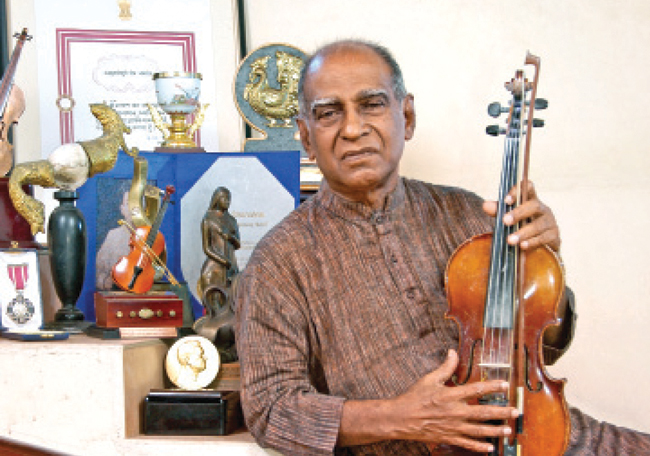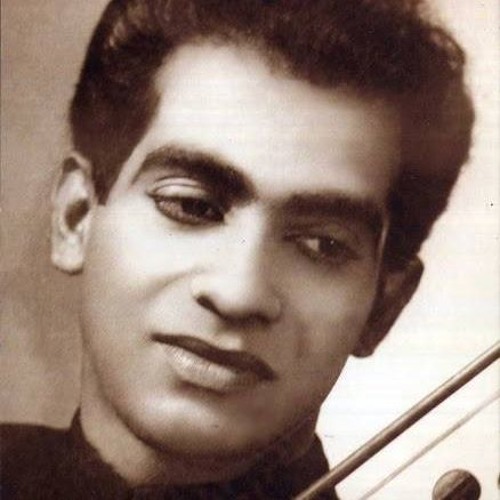Amaradeva Master’s 96th birth memorial will be held on December 5th. – By Gamini Kariyawasam
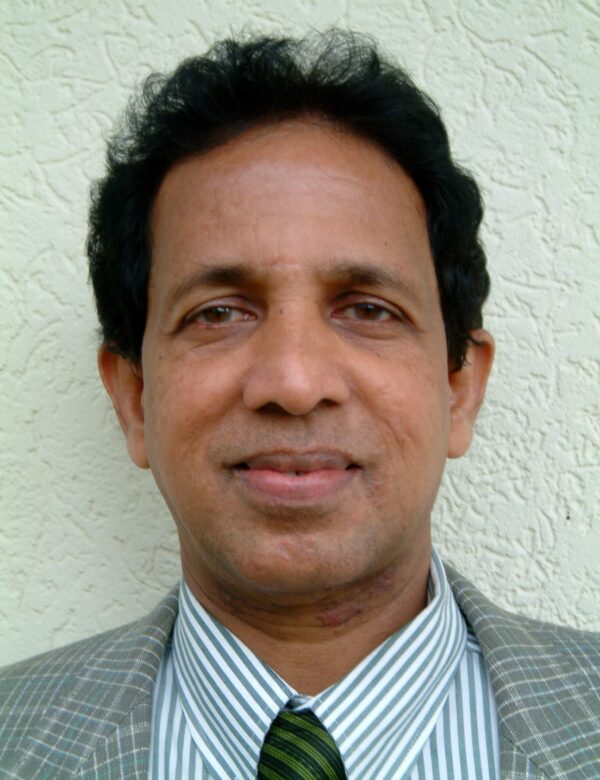
The 96th birth anniversary of Pandit Amaradeva, who conquered the local music scene, will be celebrated on December 5th.
Sri Lanka, a land of breathtaking landscapes and vibrant culture, is also home to some of the most remarkable personalities. Among these icons, the name W.D. Amaradeva stands tall as a musical legend who has left an indelible mark on the nation’s cultural heritage. In this article, we pay tribute to the life and legacy of W.D. Amaradeva, a musical maestro who will forever be remembered for his extraordinary contributions to the world of music.
Wannakuwatta Waduge Don Albert Perera, known to the world as W.D. Amaradeva, was born on December 5, 1927, in Moratuwa, Sri Lanka. His journey into the world of music began at a young age, when he started playing the violin. His passion for music led him to pursue further studies, including mastering the classical guitar and vocal training. Amaradeva’s dedication and talent were evident from a young age, foreshadowing the greatness he would achieve in the world of music.
Amaradeva’s compositions are nothing short of masterpieces. His music was not just entertainment; it was a profound exploration of Sri Lankan culture, spirituality, and identity. He created melodies that touched the hearts of millions, with themes ranging from love and nature to Buddhist philosophy and the struggles of ordinary people.
W.D. Amaradeva’s contributions went beyond his musical talents. He was a socially conscious artist who used his music to address pressing issues in Sri Lankan society. His songs often conveyed messages of unity, love, and compassion, promoting a sense of national pride and belonging.
Throughout his illustrious career, Amaradeva has received numerous awards and accolades. He was honored with the prestigious Deshamanya Award in 1998, the highest national honor given to a civilian in Sri Lanka. His music also earned international acclaim, with performances in many countries and recognition from global audiences.
After Amaradeva’s death in 2017, the Sri Lankan government honored him with Sri Lankabhimanya, the highest national honor. Even though he became popular in the country and internationally, Amaradeva’s lifestyle is very simple. He is full of immeasurable qualities. Although the world has awards at his feet, he was an ordinary person who lived his life with his feet on the ground. Intelligent people and fans loved that simplicity. Amaradeva’s entire life was characterized by that supremely simple nature.
When we look at his achievements in the field of singing, it seems that the glory of the giant musical mastery of this small man is indescribable.
Chandraratna Manawasingha’s combination of meaningful verses, not only with his emotional melody but also with his rich musical knowledge, made a beautiful song, the rare one below.
The song indicates intensively.
(ප්රේම තටාකේ….”)
This song vividly evokes the charm of a romantic chain of thoughts between the hearts of young lovers through allegorical metaphors of nature.
1959 was a turning point in Amaradeva’s aesthetic journey. In the same year, Amaradevayan was honored with the position of radio orchestra leader. Another fateful event gave his music worship a new lease of life. In 1960, Mahagama Sekara left the teaching profession and joined Radio Ceylon as a thesis editor. We see the arrival of the Sekaras as a result of the previous sasara saroo habit associated with the Amaradevas. Sekara and Amaradeva came together creatively for the first time at Radio Ceylon. Under the guidance of Prof. Sarachchandra, the immortal ‘Madhuwanti’ song in the history of radio was created by the men of the Amaradeva Sekara era. ‘Madhuwanti’ musical programme travels from village to village through radio waves, uniting the listeners. It should be mentioned separately that there is a raga called Madhuvanti in the Uttara Bharati raga system.
The song ‘Mala Ira Basina Handhe Yame’ is the first fruit of Amaradeva-Sekara Design Harmony. It was created as the theme song of Chitrasena’s ‘Nala Damayanti’drama.
“Madhuwanti”. For the radio program Amaradeva, created by Sekara and raised to the seventh note (සප්ත ස්වර) together with him, “Ratna Deepa Janma Bhumi” is a song that has been praised by the entire nation and is a song that stirs national sentiments.
Ratna Dipa
Mahagamasekara, Amaradeva, also gave a miraculous light to the Sinhala cinema dynasty. Songs such as ‘Satsamudura’ (Sinindu Sudu Muthu Talawe), ‘Parasathumal’, and ‘Ransalu’ (Siripa Piume) are examples.
On August 27, 1963, Amaradeva got married to Vimala after a long love affair. She is a talented folk singer and dancer. Amaradeva had one son (Ranjan) and two daughters (Subhani and Priyanvada)..They are also talented singers.
In the year 2015, Amaradeva participated with Vimala in the “Sasara Wasanathuru Music Concert.”
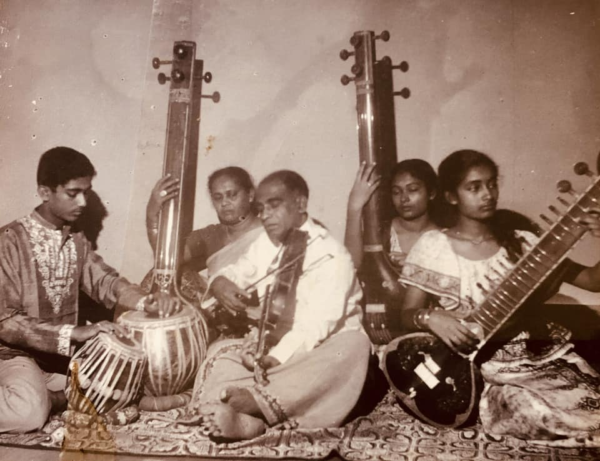
Music Orchestra-Amaradeva couple with their three children ( Ranjan, Subhani, Priyanvada )
“ශාන්ත මේ රෑ යාමේ”…
රන්ජන් අමරදේව
In my professional life, I had the good fortune of being in close association with Amaradeva Master. I first met him when I was working as a sound controller at National Radio. One day in the past, I was assigned the duty of recording and handling the sound of his light song program in Studio 05 of the radio station. Amaradeva sang the first song of the program and left the studio for a long time. It was almost 12 p.m. I see how. I searched all the places, including the canteen of the radio station, in an effort to find him. Finally, I saw him sleeping in Studio 1 of the radio station alone, resting his head on the piano there. “Master, it’s like sleeping soundly; the orchestra is waiting for the singer to come to the recording…” I said. “I didn’t sleep, Gamini; I was lazily recuperating…” He replied. I later realized that while recording several songs in a row, it was a characteristic of his life to stay still and silent and enjoy a lazy recovery.
I met Amaradeva for the second time in my professional career when I was working in the Department of Ayurveda in Navinna as Commissioner of Ayurveda. At that time, he was residing in Nalandarama Mawatha, which is near my office. Every morning, it was customary for him to walk around the Nawinna herb garden and come to my office to enjoy a cup of කොළ කැද with me.
On July 6, 1999, I sent a letter to Master, asking him to sing and record the Ayurvedic theme song created by Pandita Gunapala Senadheera with a suitable melody.

He responded well to it.
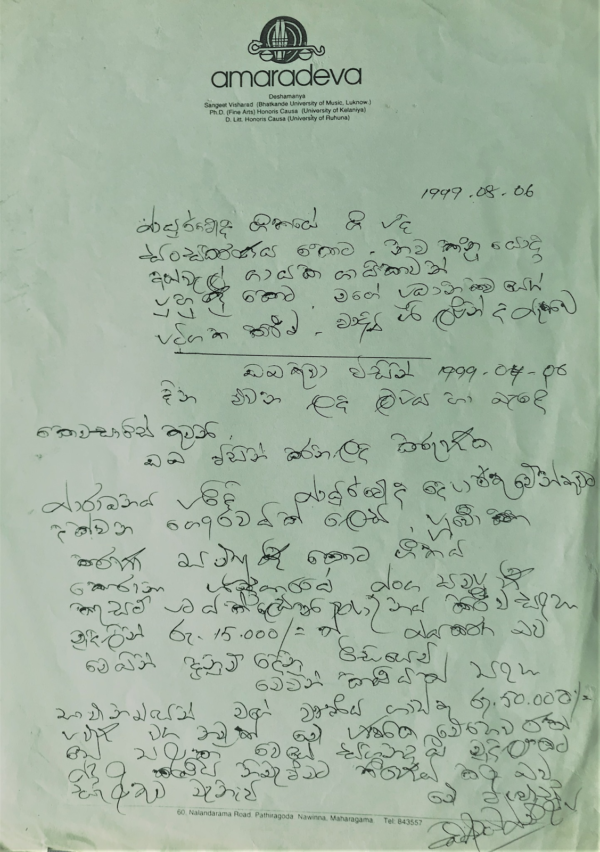
Amaradeva’s artistic handwriting
On the appointed day, I took a copy of the Ayurvedic theme song composed many years ago by Pandita Gunapala Senadheera and went to the respective studio. Although Amaradeva tried hard to create a melody for that song, the melody produced was not very attractive.
As Amaradeva deftly tuned the strings of his violin, his voice rose in harmony with the melodious notes.
“Let’s distill the essence of Gunapala Senadhiran’s lyrics into a series of soothing verses, weaving a new melody that revolves around Ayurveda,” he suggested a slight frown on his face. With each delicate adjustment of the violin’s strings, I adapted my words to resonate perfectly, crafting heart-touching verses that encapsulated the timeless wisdom of Ayurveda.
Together, in a harmonious blend of creativity, we birthed an innovative Ayurvedic theme song. Breathing life into the simplistic yet graceful lyrics, Amaradeva sang with a soulful, spiritual resonance. Simultaneously, we captured the essence by recording this song.
Ayurveda theme song:
In 1990, I had the opportunity to meet Amaradeva for the third time in my career. During that period, I served as the general manager of ITN Television. I extended an invitation to Master Amaradeva to participate in the video recording of some of his popular songs. These recordings took place in the picturesque village of Kitulgala, nestled along the slopes of a mountain.
Kithulgala Kalani river bank
I vividly recall how, after the television recordings, we would unwind and rejuvenate by the bank of the Kelani River in the evening, savoring its waters. Amaradeva, holding his Maduvitha ( glass with alcoholic beverages), softly recited portions of songs, passionately discussing the potential of local music. His insightful comments during those moments remain etched in my memory, indelible until the end of my days. Nihal Abeysuriya, the engineer of Independent Television, was also present and contributed to this remarkable event.
Wakkada laga…
On that day, I recall the occasion when Mr. Amaradeva was invited to create a theme song for the independent TV channel. Mr. Amaradeva used a melodious melody to compose a piece by Prof. Sunil Ariyaratne and transformed the following lyrics into a unique theme song with his powerful voice:
මංගලම් මංගලම්
ජයතු ජයතු මංගලම්
මුළු රට සනහා
ගම් දොරෙහි ද රස වපුරයි
දස අත මිහිරෙන් පුරවයි
ස්වාධීන රූපවාහිනී …
Pandita Amaradeva, who made an incomparable contribution to the development of Sinhala music for over 60 years and created a new path in Sinhala music and song literature, passed away on November 3, 2016 at the Sri Jayawardenepura Teaching Hospital. Let’s pray for his eternal rest.
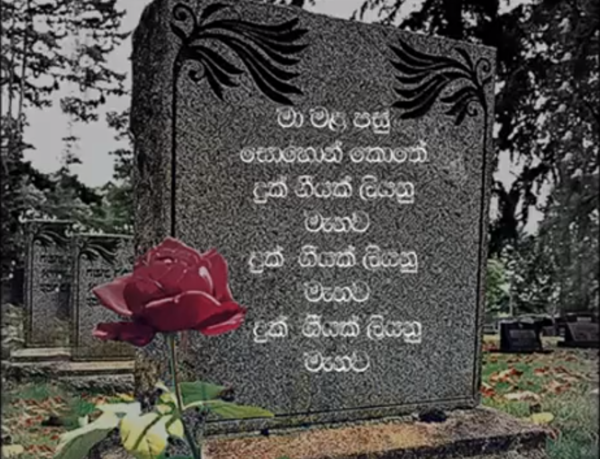
We are grateful to Ranjan Amaradeva, son of Amaradeva, for providing the rare photographs related to the article.
Dr. Gamini Kariyawasam.


